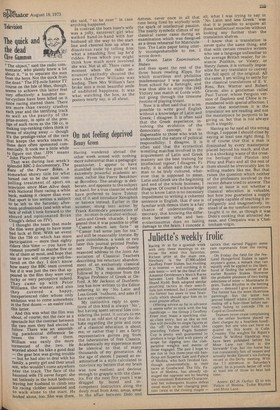On not feeling deprived
Benny Green
Having wandered abroad the other week armed with nothing more substantial than a pedagogic peashooter, I appear to have stumbled under the guns of two extremely powerful academic armies, rather like Pierre Bezukhov at Borodino. The analogy is deliberate, and apposite to the subject at hand, for a true classicist would have preferred to leave Tolstoy out of it and introduce Xenophon or Seneca instead. Earlier in the summer, stung into action by Frank Kermode's presentation of the no-man-is-educated-withoutLatin-and-Greek charade, I suggested that it was possible to offer "Caesar adsum jam forte" as "Caesar had some jam for tea" and still be reasonably literate. By pure coincidence, a week or two later this journal printed Profes sor Trevor-Roper's closely reasoned address to the Joint Association of Classical Teachers describing his reluctant abandonment of an exclusively classical position. This was immediately followed by a response from the Regius Professor of Greek at Oxford. A Mr Jackson of Dunfermline has now written to the Editor referring to my 'No Latin and Less Greek 'Outburst, and asks if I have any comments.
My instinctive reply to questions of this kind is always No but having spent several Ides considering the point, it occurs to me that in an odd sort of way the debate regarding the pros and cons of a classical education is about me, or rather thay I am a fairly representative guinea pig from the laboratories of free Classics. Academically my experience must be identical to that of many thousands of my generation. At the age of eleven I passed an examinatiolf in a style calculated to convince my betters that my brain was now resilient and devious enough to grapple with the classics. For the next five years I was dragged by bored and incompetent instructors along the dusty road from Arno, amas, amat to the affair between Dido and Aeneas, never once in all that time being fired by anybody with the spark of intellectual passion. The neatly symbolic climax of my classical career came during an examination which was designed as a dress rehearsal for Matriculation. The Latin paper being utterly incomprehensible to me, I wrote down; B. Green. Latin Examination. Habeo and then spent the rest of the three hours reading Kipps, for which scurrilous and philistine misdemeanour I was suspended from school for a fortnight, and was thus able to enjoy the 1945 Victory test match at Lords without going through the tiresome routine of playing truant.
Now it is often said that it is impossible to write good English without a knowledge of Latin and Greek; I disagree. It is often said that the Greek experience, involving the evolution of the democratic concept, is indispensable to those who wish to understand the nature of political responsibility; I disagree. It is often said that the syntactical wrestling matches involved in the acquirement of Latin and Greek mastery are the best training for intellectual vigour; I disagree. Finally, it is often said that for a man to be truly cultured, whatever that is supposed to mean, Latin and Greek are the beginning and end of the whole business; I disagree. Of course I acknowledge that to know Latin is no necessary impediment to writing a coherent sentence in English, that if one is familiar with demos there is a fair chance of understanding democracy, that knowing the difference between urbs and _benevolentissumus does no lasting, damage to the brain. I concede it
all; what I was trying to say in 'No Latin and less Greek' was that it is possible to acquire all these intellectual muscles without looking any further than the translation shelves.
I know that a 'translation is never quite the same thing, and that with certain creative writers who use a language unfamiliar to the average British reader, for instance Pushkin, or Valery, or Henry James, it is virtually impossible for any translator to convey the full spirit of the original. All the same, I am willing to settle for the classical translations of E. V. Rieu, Rex Warner and Robert Graves, also a gentleman called Paul Turner, whose Penguin version of Daphnis and Chloe is remembered with special affection. I know that sometimes it is the translator we are reading and not the masterpiece he purports to be giving us, but that is not always such a tragedy.
Having so far said all the wrong things, I suppose I should close by saying at least one right thing. It is of course true that a man is diminished by every masterpeice placed beyond his reach, and that it is a shocking waste of the creative heritage that Plautus and Pliny and Plato and all the rest of them should be irrevocably lost to willing readers like me. But that raises the question which neither of the professors involved in the recent debate tried to answer. The point at issue is not whether a classical education is valuable, but how you guarantee a supply of people capable of teaching it intelligently and imaginatively, in stead of as my tomfool instructors taught it to me, as though it was Dido's cooking that attracted Aeneas, and Cleopatra was a'Chelten ham virgin.
































 Previous page
Previous page